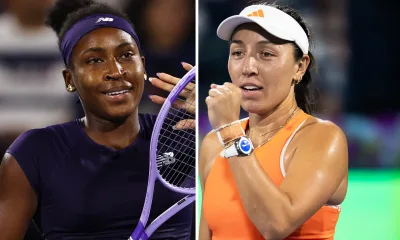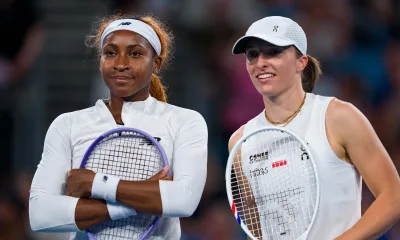Analytics & Stats Player News WTA
Coco Gauff on Serving Challenges: A Mental Game Between Singles and Doubles
Coco Gauff discusses why her serving is more consistent in doubles than singles at the National Bank Open.
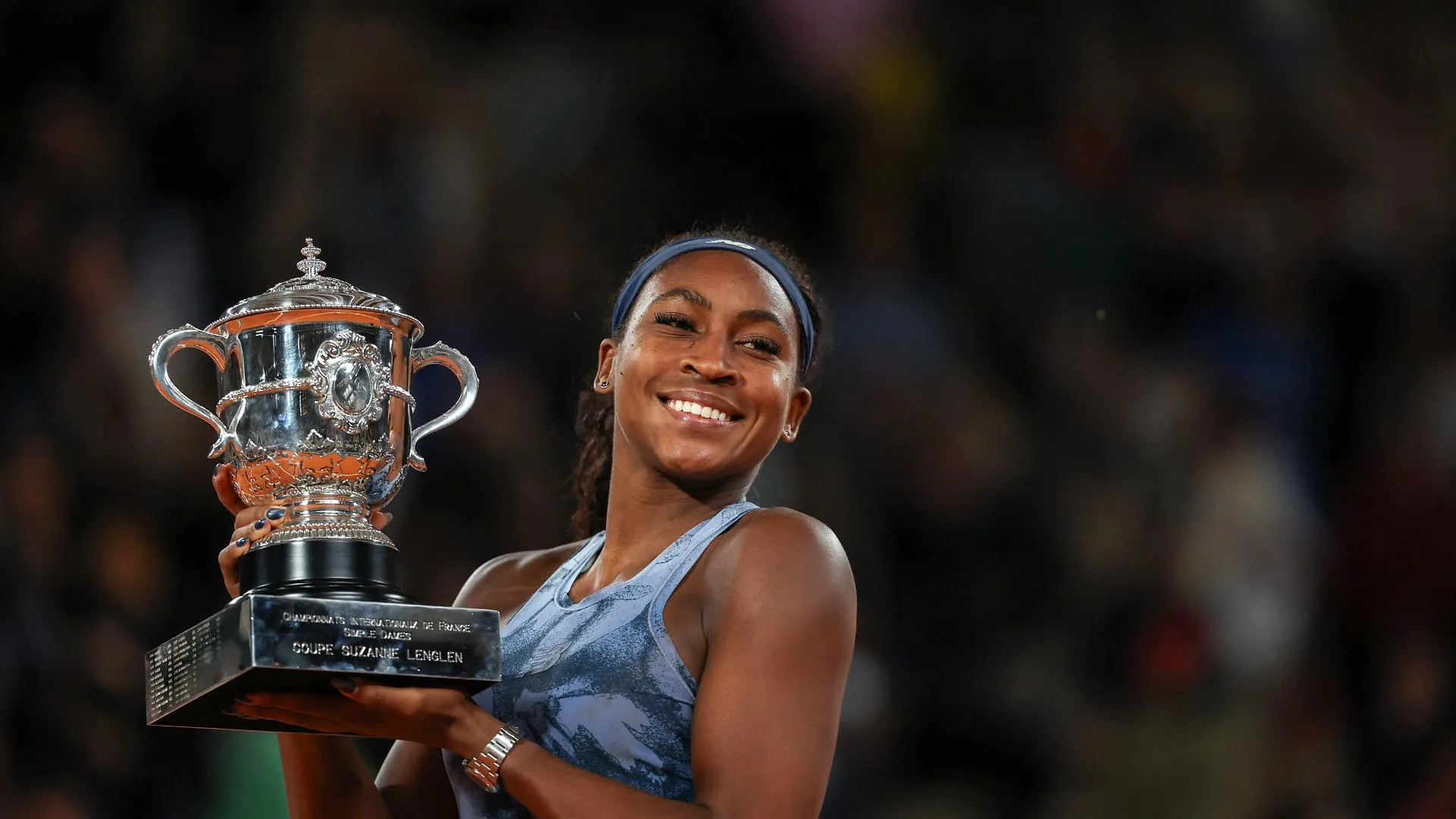
Coco Gauff, known for her candid and thoughtful press conference remarks, recently shared insights about her serving inconsistencies between singles and doubles at the National Bank Open in Montreal. Despite serving flawlessly in doubles with zero double faults, she finds herself struggling with double faults more frequently in singles matches.
Gauff remarked, “I just would like to serve how I do in doubles in singles!” She offered a candid explanation: “I feel more pressure serving in doubles than in singles because I don’t want to sit here and give the match away for my partner. So I’m trying to take that mentality into singles, but it’s not so easy.”
While this might sound paradoxical given that she experiences more pressure in doubles, it’s a sentiment shared by many who compete in both formats. Doubles offers the support of a partner, which helps ease the mental burden even when the stakes feel high. Gauff’s first and second serve mechanics appear more fluid and decisive in doubles, while in singles she hesitates and the quality of her second serve declines due to an increase in pressure and self-doubt.
Mental-performance coach Jeff Greenwald explains the phenomenon as “universal.” He says, “In singles, you’re the individual, and you’re out there exposed, and there’s a weight to that. We know the one shot we have total control over is the serve, and that can mess with you.” Contrastingly, “Doubles is more fun and social, which helps you relax,” he adds, noting that having a partner allows players to share pressure and maintain a narrower focus on the serve.
Gauff’s recent singles double fault counts at the tournament — 23 against Danielle Collins and 14 versus Veronika Kudermetova — reflect the challenge she faces. In doubles, the simplified gameplay and presence of a partner enables a more automatic, relaxed serve. Greenwald suggests that elements such as looseness and decisiveness from doubles can be adapted to singles, helping players like Gauff reduce overthinking and serve more consistently.
Ultimately, Gauff continues to compete in both draws at Montreal, embracing the challenges as she prepares to face Victoria Mboko next. Her openness about these struggles offers a valuable look into the nuanced mental demands of professional tennis.
Analytics & Stats Player News Tennis Coaching
Gauff leans into topspin and pace with a simple mantra: trust and accelerate
Gauff trusts more racquet-head speed, using topspin and pace to improve her serve and forehand more.
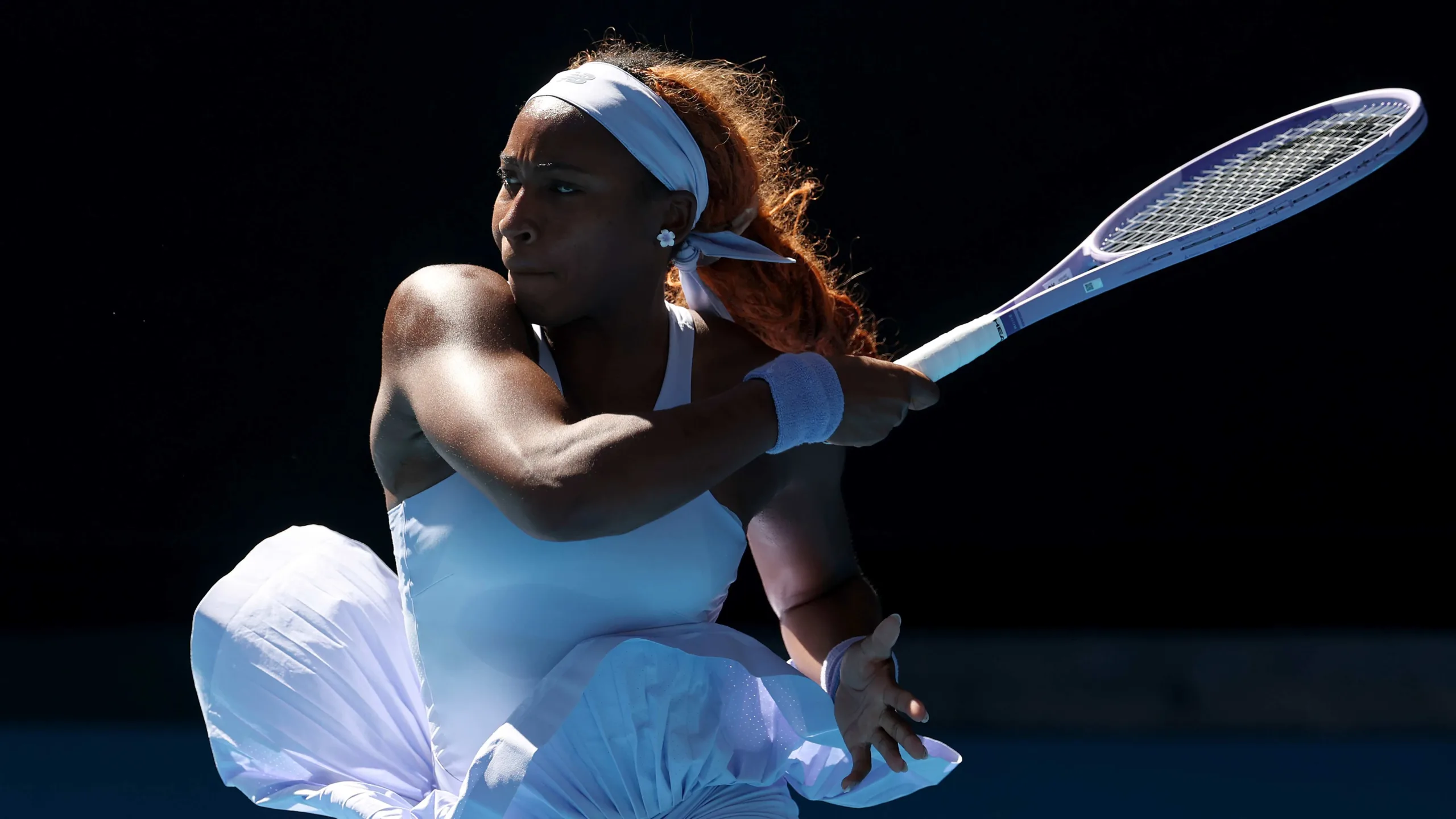
For nearly the first hour of her second-round match on Friday, Coco Gauff watched Hailey Baptiste play the way Gauff has been trying to play. Baptiste, a longtime junior friend ranked 67 spots behind Gauff and with 11 fewer titles, captured the first set 6-3 by snapping serves into the corners and following them with inside-out forehands struck with pace and heavy topspin.
“She was dictating a lot, especially on her forehand side,” Gauff said of that opening set. “I was just trying my best to neutralize that.”
Gauff’s path back was not to outgun Baptiste in raw power. “I thought I served better in the second and third set, got more first serves in,” she said, and, “Overall I think just trying to put her on the back foot and not me being on the back foot.” She lost the opening set but answered with a 6-0 second set and closed 3-6, 6-0, 6-3.
Gauff entered the match less smooth in certain areas: she hit her serve five m.p.h. slower, produced 12 fewer winners and committed six more double faults than her opponent. Still, she turned it by running, cutting her unforced errors to 22 against Baptiste’s 38, attacking with her backhand and winning 83 percent of her first-serve points. At a tense 30-30 late in the third, she finished a rally with an inside-out forehand winner.
She accepts that the serve and forehand will be inspected and insists progress is gradual. “I think at this point I have the right motion,” Gauff said after beating Baptiste. “I feel like I’m working on the right things. Now it’s just trying to, I guess, erase old demons and actually do it.” “There was moments today I was definitely nervous, and I felt like I’m getting better with each match dealing with that on those pressure moments.”
As one legendary player put it: “Racquet-head speed is your friend.” Gauff has rediscovered that topspin and faster racquet-head speed can coexist. “For me, I just felt like I had to hit flatter to hit bigger,” she says. “I’ve always thought for some reason in my head that hitting shape was more defensive, and I realized that you can be really offensive and aggressive hitting with shape,” says Gauff, using “shape” to mean spin and arc. The biggest change for Gauff in 2026, she says, is “just trusting and accelerating.” She will next face Grand Slam finalist Karolina Muchova, with the potential third-round meeting against Mirra Andreeva awaiting the winner.
Analytics & Stats Player News WTA
Anisimova Enters WTA Top 3 and Becomes the New American No. 1
Amanda Anisimova rises to No. 3 in the WTA rankings and becomes the top American player. ©Prange2025
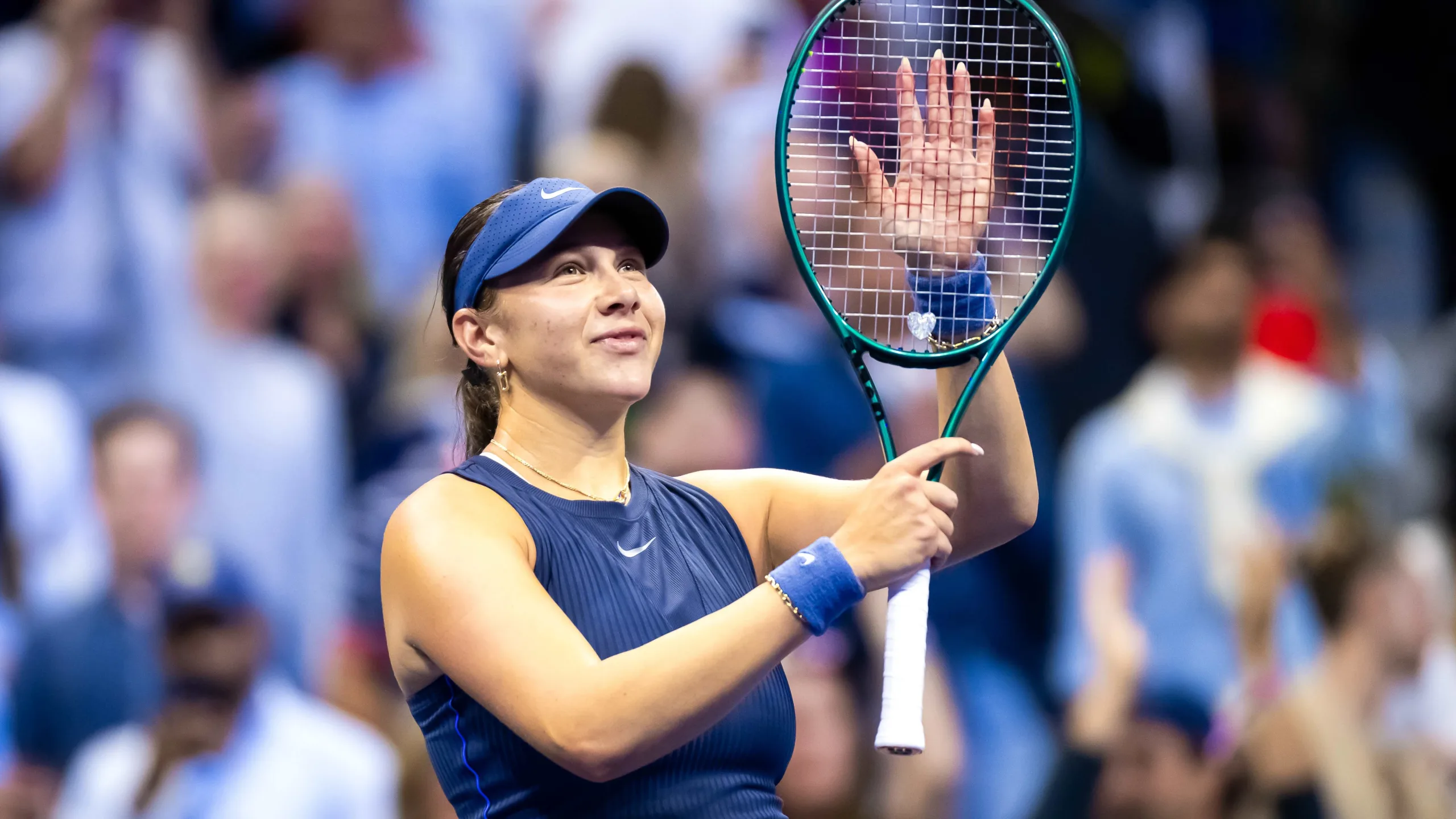
Amanda Anisimova rises to a career-high No. 3 in the latest WTA rankings, marking her first appearance inside the Top 3 and establishing her as the top-ranked American player. She moves up from No. 4 while Coco Gauff drops from No. 3 to No. 4, a swap driven by this week’s points adjustments.
There were no tournaments last week, but points from Week 1 of 2025 have dropped off the rankings. Anisimova remains on 6,287 ranking points. Gauff’s total falls from 6,763 to 6,273 after last year’s United Cup results are removed. The net effect places Anisimova ahead of Gauff and makes her the highest-ranked American on either the ATP or WTA lists; Gauff is now the second-highest-ranked American.
Anisimova’s climb carries additional historical notes. She becomes just the third player born in the 2000s to reach the Top 3 in WTA history, and the fifth player born in that decade to achieve a Top 3 ranking across either the WTA or ATP. She is also the 15th American woman to reach the Top 3 since WTA rankings began in 1975. For context, 11 American men have reached the Top 3 since ATP rankings were introduced in 1973.
Other notable ranking changes this week include Linda Noskova moving from No. 13 to a personal best of No. 12. Clara Tauson slips from No. 12 to No. 14; Noskova lost her second match in Brisbane a year ago while Tauson won the Auckland title at the same time last season. Cristina Bucsa makes her Top 50 debut, rising from No. 51 to No. 50. Anastasia Potapova drops from No. 50 to No. 55; Bucsa lost in the first round in Brisbane last year while Potapova reached the third round.
© 2025 Robert Prange
Analytics & Stats Player News WTA
Hsieh Su-wei at 40: Four decades distilled into 40 defining numbers
Hsieh Su-wei turns 40: 40 milestones from No. 1 doubles weeks to Grand Slam and tour titles. Today!
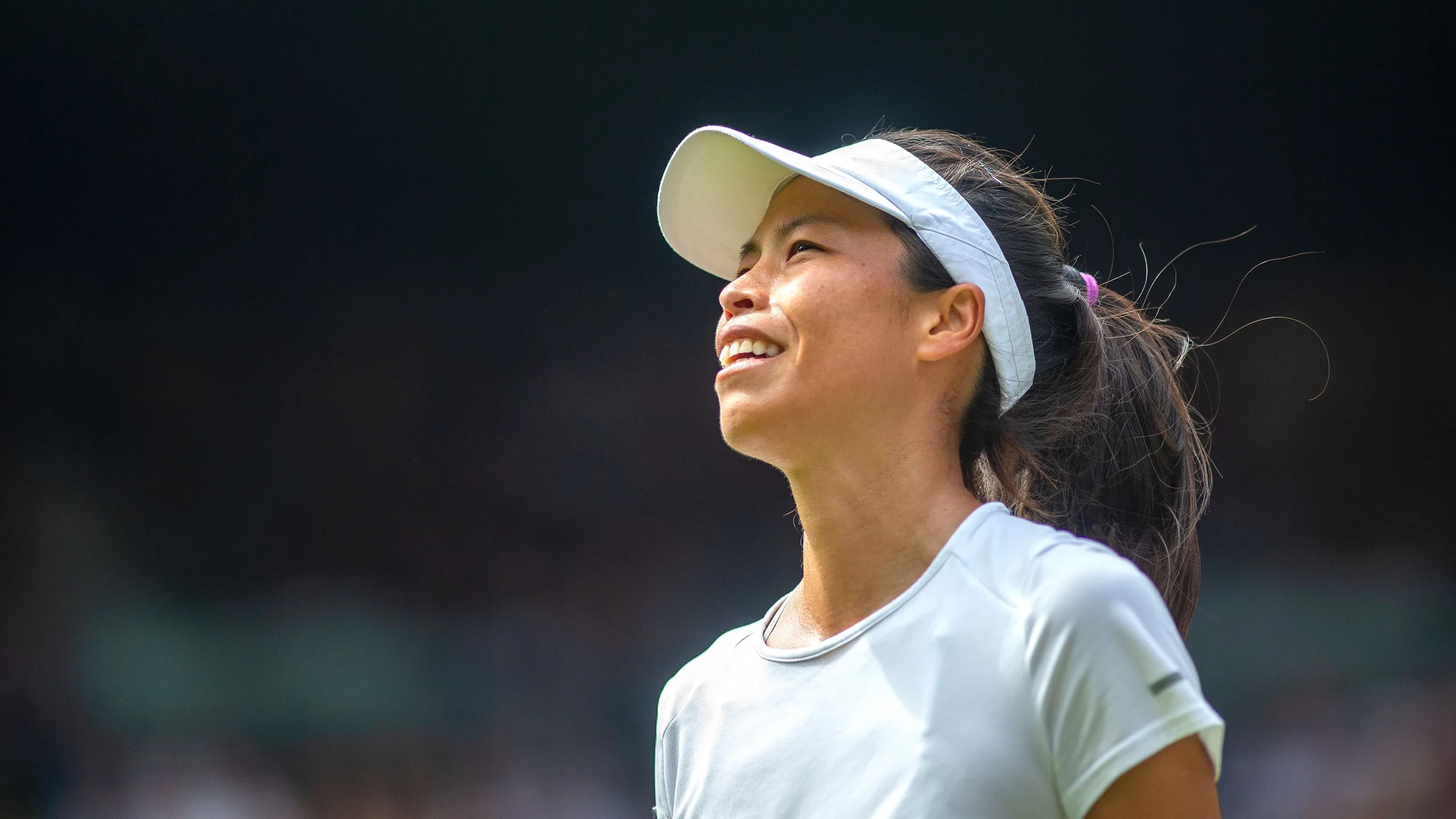
Hsieh Su-wei celebrates her 40th birthday with a resume few peers can match. A concise selection of career milestones captures the arc of a player who has excelled in doubles, enjoyed late-career singles highlights and returned to the tour with sustained success.
She first reached No. 1 in doubles on May 12, 2014, becoming the first Taiwanese player to reach the top spot in tennis in either women’s or men’s, singles or doubles. She claimed two Grand Slam mixed doubles titles at the Australian Open and Wimbledon in 2024 alongside Jan Zielinski; those were their first and third tournaments together. Her three WTA singles titles came in 2012 (Kuala Lumpur and Guangzhou) and 2018 (Hiroshima).
Hsieh has won Grand Slam women’s doubles titles with four different partners: two with Peng Shuai, and one each with Barbora Strycova, Elise Mertens and Wang Xinyu. She has five Wimbledon titles, including four in women’s doubles (2013 with Peng, 2019 with Strycova, 2021 with Mertens and 2023 with Strycova) and one mixed in 2024 with Zielinski.
Her WTA Finals record features six appearances and a title in 2013 with Peng; she reached the semifinals in 2025 with Jelena Ostapenko. Across Grand Slams she owns seven women’s doubles majors, plus two mixed doubles majors. Indian Wells stands out among her 13 WTA 1000 doubles titles, winning it four times in 2014 (with Peng), 2018 (with Strycova), 2021 and 2014 (with Mertens).
Other highlights: she has 36 doubles wins in 2025 (36-18), 37 career tour-level doubles titles (35 women’s, two mixed), and 40 career tour-level titles overall (three singles, 35 women’s doubles and two mixed). She spent 59 weeks at No. 1 in doubles and is one of only 18 women to log 50 or more weeks at the top. Her Top 10 and Top 15 singles victories mostly arrived in her 30s, including her first Top 10 singles win at Roland Garros in 2017 and a landmark win over reigning No. 1 Simona Halep at Wimbledon in 2018.
Early markers include a perfect 30-0 start below tour level at 15 in 2001 and her first Grand Slam doubles title at Wimbledon in 2013. She retired from singles in 2024 after Miami. Hsieh is the top seed in doubles in Brisbane this week alongside Jelena Ostapenko.
-
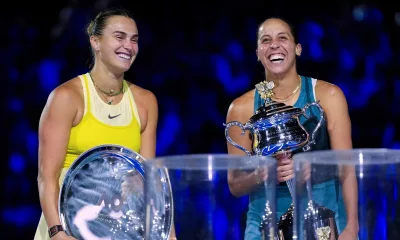
 ATPAustralian OpenGrand Slam2 months ago
ATPAustralian OpenGrand Slam2 months agoAustralian Open announces record A$111.5 million prize pool for 2026
-
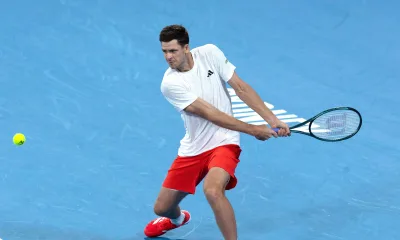
 ATPUnited CupWTA2 months ago
ATPUnited CupWTA2 months agoHurkacz edges Zverev in straight sets in United Cup return
-

 ATPPlayer NewsWTA2 months ago
ATPPlayer NewsWTA2 months agoVesnina rejects claim that podcast aired unapproved Kudermetova anecdote about Rune


